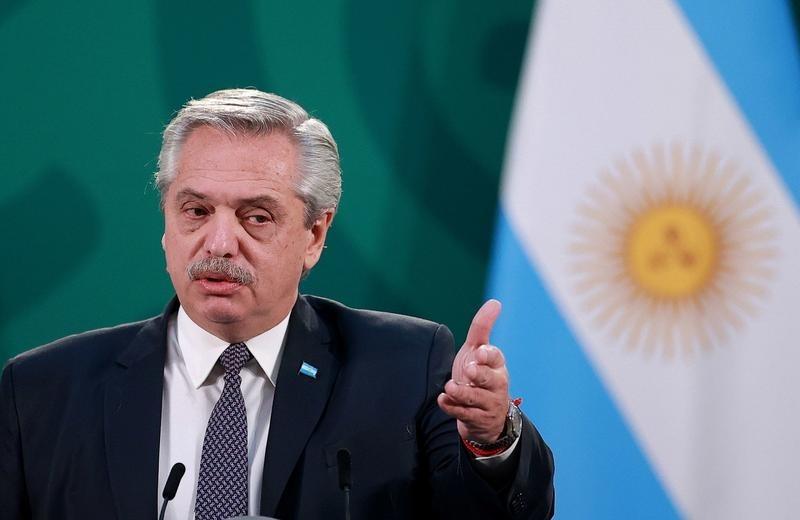 This undated photo shows Argentinian President Alberto Fernandez. (PHOTO / BLOOMBERG)
This undated photo shows Argentinian President Alberto Fernandez. (PHOTO / BLOOMBERG)
Argentina’s ruling coalition was defeated in the country’s midterm elections on Sunday, and it’s poised to lose its Senate majority in a setback for the government at a time it faces a wrecked economy.
The left-wing bloc led by President Alberto Fernandez was losing in six of eight senate races with at least 97 percent of votes counted in each province, signaling that the government will drop below the 37 senators needed to call a quorum and move legislation forward. It’d be the first time since 1983 that Peronism, the movement founded by Juan Peron in the 1940s, won’t have control of the chamber.
In lower house races, opposition candidates won the key race in the province of Buenos Aires, the country’s largest and most politically influential district, leading with 40.1 percent of votes versus the ruling coalition’s 38.4 percent
Losing the Senate majority would mark a major setback for the government, especially for the powerful Vice-President Cristina Fernandez de Kirchner, who presides over the chamber, and will complicate the passage of legislation. On a national level, the opposition Juntos por el Cambio got 42 percent of the electorate compared to 33 percent for the ruling coalition with 98 percent of the votes counted, according to local newspaper La Nacion.
“The market is likely to take a net positive view of the election results,” Goldman Sachs Group Inc economist Alberto Ramos wrote in a research note. “A more market-friendly composition of congress could lead to more effective checks and balances and ultimately a policy regime shift in 2023, but there is also the risk of more populist near-term policies.”
ALSO READ: Argentina political crisis deepens as VP blasts president
In lower house races, opposition candidates won the key race in the province of Buenos Aires, the country’s largest and most politically influential district, leading with 40.1 percent of votes versus the ruling coalition’s 38.4 percent. Still, the government improved its performance compared to a September primary vote and was fighting to retain the first majority in the lower house. Opposition candidates won other key congressional races in the city of Buenos Aires by a landslide, as well as in typically Peronist provinces like Santa Cruz and La Pampa.
Voters lost confidence with Fernandez’s government over its handling of the pandemic and an economy marked by 52 percent annual inflation, 40 percent poverty and jitters over its weakened currency. It also represents a comeback for the opposition bloc of former President Mauricio Macri, who was voted out of power in 2019 amid a historic recession. Turnout was 72 percent, the lowest levels in over three decades.
New Plan
The government will submit to congress a bill with a multiyear economic program in the first week of December, and will seek consensus from the opposition on this “shared agenda,” Fernandez said following the results. That bill will seek to include “whatever best understandings we have reached” with the International Monetary Fund, with which the government is negotiating to reschedule over $40 billion in payments owed.
ALSO READ: Argentina's ruling coalition dealt big blow in primary election
That debt is “the biggest stumbling block we face as we look to return to economic recovery and a more equitable country,” Fernandez said in taped remarks. “I won’t fall for those who speak of the benefits of austerity, a path that’s already been tried and failed.”
Fernandez added that he has support from his coalition to pursue this bill. While that is an “encouraging” statement, questions remain on whether the wide-ranging leftist coalition will be able to move past its differences, said Benjamin Gedan, director of the Argentina Project at the Washington-based Wilson Center.
“His characterization of the agreement of having the support of his diverse and combative coalition strikes me as wishful thinking but would be delightful if true,” Gedan said. “It’s far fetched to claim that a plan that could meet IMF standards and satisfy the IMF board is fully supported by the Peronist coalition.”
Investors will be keeping an eye out on next statements from Kirchner, who herself was president from 2007 to 2015. After the September primary, she published an explosive essay criticizing the president over strategy, including what she noted was a lack of spending. It’s unclear what policy or cabinet changes Kirchner may now demand.
“Cristina’s instinctual reaction to any political weakness is more spending, more money printing, so it’s hard to picture an easy dialog within the coalition to arrive at a consensus for a new program,” Gedan said.”


